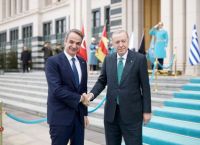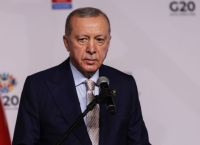Macron’s Gamble on Palestine: Diplomacy or Spectacle?

Πηγή Φωτογραφίας: AP Photo//Macron’s Gamble on Palestine: Diplomacy or Spectacle?
A High-Stakes Diplomatic Play
French President Emmanuel Macron is attempting a bold “diplomatic coup” on Monday by convening several Western nations in New York to recognize a Palestinian state. Yet, experts say his efforts are far from producing meaningful progress on the ground in Gaza.
The limits of influence at the United Nations General Assembly are clear. European powers like Germany and Italy are declining participation, and there is little chance of persuading U.S. President Donald Trump or Israeli Prime Minister Benjamin Netanyahu to halt military operations.
Who’s on Board?
Macron hopes to showcase a coalition of support, with countries including France, the U.K., Belgium, Portugal, Luxembourg, Malta, Andorra, Australia, and Canada publicly recognizing Palestinian statehood. A French official described the effort as a “diplomatic victory” for Paris.
“I recognize the legitimacy of so many Palestinian people who want a state,” French President Emmanuel Macron tells CBS.#Macron #Palestine pic.twitter.com/XPQgWYCAiN
— Al Arabiya English (@AlArabiya_Eng) September 21, 2025
The broader aim is to create a counterweight to Trump’s support for Israel in Gaza, applying pressure for peace. Observers draw parallels to France under Jacques Chirac in 2003, when Paris opposed the U.S. invasion of Iraq despite limited global influence.
Domestic Pressure and Public Opinion
Macron also faces strong domestic political incentives. Western European public support for Israel is at historically low levels, according to YouGov polls, as casualties mount in Gaza. European leaders are aware of rising public outrage and the need to align with voters’ sentiments.
However, the scale of Macron’s influence is questioned. Even French officials admit that grand gestures in New York will not alter the worsening humanitarian crisis, as Israeli tanks advance on Gaza. Neither Israel nor the U.S. are likely to change their course due to Macron’s initiatives.
Europe Divided
Macron’s effort also exposes deep divisions in Western Europe. Germany, Italy, Greece, and the Netherlands will not sign onto the initiative. German Chancellor Friedrich Merz will not attend, citing domestic priorities, while Italian Prime Minister Giorgia Meloni refuses recognition of a Palestinian state before its formal establishment.
A senior European diplomat described the gamble: “The hope was that Israel would yield under international pressure. But that doesn’t seem to be happening. The U.S. fully backs Israel and accelerates West Bank annexations.”
Symbolism Over Immediate Impact
For many analysts, Macron’s push is less about immediate change and more about Europe positioning itself vis-à-vis Israel. Europe is haunted by its role in the Holocaust and has historically taken small, symbolic steps against Israel, despite discomfort with its treatment of Palestinians, according to Kristina Kauss of the German Marshall Fund.
Recent moves by the European Commission to impose potential sanctions and tariffs on Israel mark a significant shift in European thinking—unprecedented for trade measures typically reserved for authoritarian regimes.
U.S. and Israel Pushback
Leading up to Macron’s conference, both the U.S. and Israel attempted to undermine French diplomatic efforts. Washington recently denied a visa to Palestinian Authority President Mahmoud Abbas, preventing him from attending the UN session.
Israel has proposed retaliatory measures and sought to link French recognition of Palestine to the release of remaining Israeli hostages held by Hamas. As one anonymous Israeli official told POLITICO: “If recognition is tied to hostage release, Israel might accept it. Otherwise, it won’t change anything.”
A Legacy Move?
For Macron, the conference is also a chance to leave a diplomatic legacy. Former French ambassadors note parallels to France’s 2003 stance on Iraq: symbolic but unable to halt conflict. “It risks being a waste of time,” said one diplomat.
The European lineup is modest: Spain, Belgium, Portugal, Luxembourg, Malta, Canada, and Australia will participate, while major powers like Germany, Italy, and the U.K. remain cautious or absent.
The Real Power Lies Elsewhere
Even if Macron rallies support, real influence continues to reside with Israel’s unwavering ally, the U.S., as Secretary of State Marco Rubio has criticized Macron’s plan as “a slap in the face to the victims of October 7th.”
Macron’s diplomatic choreography may create a symbolic moment for Europe, but the divisions and lack of enforcement power underscore the limits of symbolism in the face of entrenched geopolitical realities.
Source: pagenews.gr
Διαβάστε όλες τις τελευταίες Ειδήσεις από την Ελλάδα και τον Κόσμο






Το σχόλιο σας